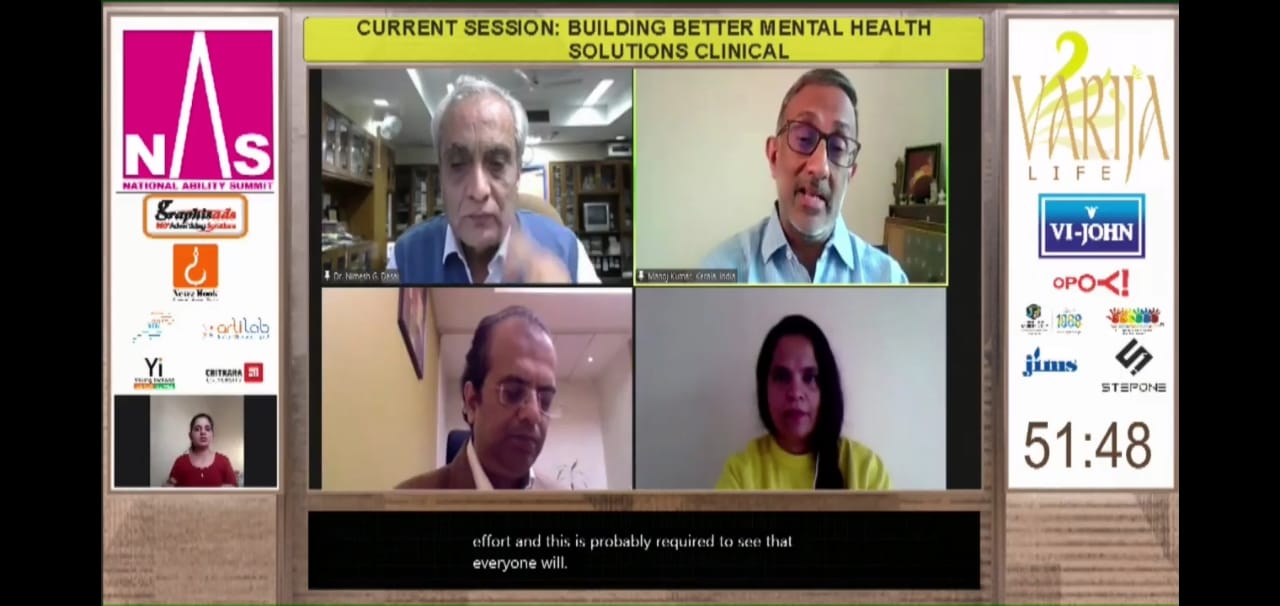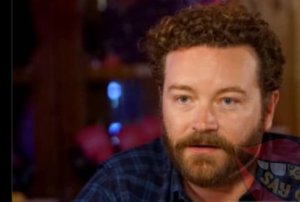The need for addressing and coping with the rising mental health issues was flagged during a virtually-held National Ability Summit (NAS), an event dedicated to create awareness about disabilities of all kinds on Wednesday.
The session, “Building Better Mental Health Solutions CLINICAL” witnessed participation by Dr. Manoj Kumar, Founder & Clinical Director, Mental Health Action Trust (MHAT), Dr. Samir Parikh, Director- Fortis National Mental Health Program and Dr. Nimesh G Desai, Director, Institute of Human Behaviour & Allied Sciences (IHBAS).
While introducing himself during the discussion, Dr. Manoj Kumar who is based in Kerela brought out an interesting model his mental health project follows and which can be adopted by other communities working on the issue.
“In our new model of mental health care, community and the families of people are the major stakeholders and the project is owned, led and run by the volunteers.” he said
He further added that this combination of mental health professionals and learning volunteers working towards a collective goal ensure the delivery of best mental health care to the section in the dire need of such services.
“We provide quality mental health services to the underprivileged patients with serious mental ailments across 8 districts of Kerala at free of cost.” he added
Calling the inclusion of mental health disabilities on par with other physical ailments a step forward, Dr. Kumar went on to discuss how meagre investment of monetary and sentimatal nature by the Governments as well as socities in general continues to be a potential threat to the recognition of Mental Health issues.
“What continues to be a front-line stigma is ‘Low government investments and Access to Mental Health care in developing nations like ours, as investment in terms of money and emotions, not just by the system, but us as individuals is significantly smaller.”he said.
Next on line was Dr. Desai, who addressed one of the key facet that is the shortage of mental health experts and willingness of psychiatrists to maintain the status-quo prevalent in the country regarding the mental health issues.
Dr. Desai noted that subjects on Mental health in meetings outside the purview of psychiatric discussions, be it medical congregation or disabilities, tend to be the last and thus explains why this issue lags behind.
Discussing how COVID-19 opened door for these tough conversations as we know it, he said “The current pandemic has actually provided a wonderful opportunity as there has been augmented discussions on mental health.”
Adding on to this bit, Dr. Kumar also articulated how COVID times normalized on screen therapies, which were believed to be impossible without face to face contact a few months back.
Dr. Desai also weighed on how educational institutes training professionals should be more community oeriented which feeds the young minds that the mental health care exists even outside the clinics and hospitals.
Being the professional involved in the most systematic models of mental health care services, Dr. Samir Parikh picked up the conversation next saying that work to be done is too much and the time is less, so who does what fairly and unfairly should be the last priority and implementation must be the key.
He also noted that mere conversation will not bring about change, but implementation will.
Changes can happen only if we destigmatize mental health, if our conversations continue to be stigmatized, if slurs and negative comments continue to be a part of our narrative, if influenzers are irresponsible, if media is irresponsible in portrayal of mental health, the problem will not abate.” said Dr. Parikh
“But you can’t say creative freedom allows you to increase stigma” he added.
On being asked his views on Mental health being a sunrise industry, Dr. Parikh rebutted the fact saying, “I don’t think Mental Health is a fashionable industry” adding that the adjective ‘trendy’ attached to it far from reality and can help only a social media trend but not patients in real life.
The main focus of the NAS is to provide a platform to world leaders from government bodies, educational institutions, health institutions, private and public sectors to share their learning curve and collectively draw a 360-degree approach to address physical and mental health for the global community at large







